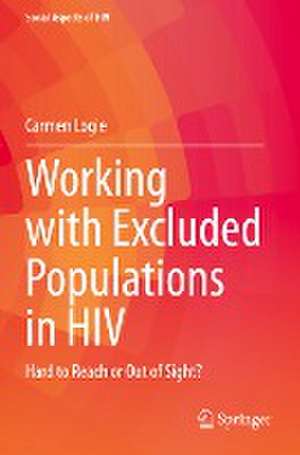Working with Excluded Populations in HIV: Hard to Reach or Out of Sight?: Social Aspects of HIV, cartea 8
Autor Carmen Logieen Limba Engleză Paperback – 7 iul 2022
| Toate formatele și edițiile | Preț | Express |
|---|---|---|
| Paperback (1) | 634.32 lei 43-57 zile | |
| Springer International Publishing – 7 iul 2022 | 634.32 lei 43-57 zile | |
| Hardback (1) | 640.37 lei 43-57 zile | |
| Springer International Publishing – 6 iul 2021 | 640.37 lei 43-57 zile |
Preț: 634.32 lei
Preț vechi: 746.26 lei
-15% Nou
Puncte Express: 951
Preț estimativ în valută:
121.42€ • 131.93$ • 102.05£
121.42€ • 131.93$ • 102.05£
Carte tipărită la comandă
Livrare economică 21 aprilie-05 mai
Preluare comenzi: 021 569.72.76
Specificații
ISBN-13: 9783030770501
ISBN-10: 3030770508
Ilustrații: XIII, 156 p. 1 illus.
Dimensiuni: 155 x 235 mm
Greutate: 0.25 kg
Ediția:1st ed. 2021
Editura: Springer International Publishing
Colecția Springer
Seria Social Aspects of HIV
Locul publicării:Cham, Switzerland
ISBN-10: 3030770508
Ilustrații: XIII, 156 p. 1 illus.
Dimensiuni: 155 x 235 mm
Greutate: 0.25 kg
Ediția:1st ed. 2021
Editura: Springer International Publishing
Colecția Springer
Seria Social Aspects of HIV
Locul publicării:Cham, Switzerland
Cuprins
Chapter 1. Introduction.- Chapter 2. Context and Storytelling.- Chapter 3. Cultural Humility.- Chapter 4. Critical Hope.- Chapter 5. Imagination and Possibility.- Chapter 6. Love, Intimate Inquiry and the Beloved Community.- Chapter 7. Conclusions and Moving Forward.
Notă biografică
Carmen Logie is the Canada Research Chair in Global Health Equity and Social Justice with Marginalized Populations and an Associate Professor in the Factor-Inwentash Faculty of Social Work at the University of Toronto. She is also an Adjunct Scientist at Women’s College Hospital, Adjunct Professor at the United Nations University Institute for Water, Environment and Health, and Research Scientist at the Centre for Gender and Sexual Health Equity. She has been awarded funding from Canadian Institutes of Health Research, Social Sciences & Humanities Research Council of Canada, Grand Challenges Canada, Canada Research Chairs, and Canada Foundation for Innovation, to lead global community-based research focused on sexual health and rights with a focus on HIV and sexually transmitted infections. She is particularly interested in understanding and addressing social and structural contexts, including intersectional stigma, and how these contexts shape sexual health—and ways in which persons navigate their social worlds. She is currently conducting mixed-methods and intervention sexual health and rights research with Indigenous Northern adolescents in Northern Canada; young gay and bisexual men living with HIV in Jamaica; and refugee and displaced adolescents and youth in Uganda. Her community-based research aims to identify social ecological vulnerabilities and protective factors associated with sexual and reproductive health care engagement and health outcomes; and provides evidence of effective community-based interventions to improve sexual and reproductive health and rights.
Textul de pe ultima copertă
This book, written decades into the HIV epidemic, reflects critically on the idea that the socially excluded populations often focused on in HIV research are in fact difficult to access and reach. The author broadly applies the concept ‘hard to reach’ to characterize populations that researchers find difficult to engage with. Social factors that produce marginalization and ultimately result in people choosing not to engage in research are not captured by the concept of ‘hard to reach’. Limited attention has focused on how researchers can address the social factors that result in decisions to not engage in research. Disrupting the ways in which people are conceptualized as ‘hard to reach’ so as to refocus on transforming social systems and personal values, beliefs and approaches is understudied. This book uses case examples based on HIV research with Indigenous youth, internally displaced women, LGBTQ communities in the Global North and Global South, and persons at the intersectionof these identities, to identify successful approaches to working with marginalized and often vulnerable communities and groups. The chapters signal the need for attention to five key social factors when developing successful approaches: context and storytelling; cultural humility; critical hope; imagination and possibility; and love, intimate inquiry, and the beloved community, if nations, individuals and communities are to address the epidemic in a sustainable and impactful way.
Caracteristici
Offers an innovative approach to working with populations labelled ‘hard to reach’ Spans four countries and a decade of primary field research with populations disproportionately affected by HIV Provides novel theoretical principles for researchers to adopt when working with members of marginalized communities







